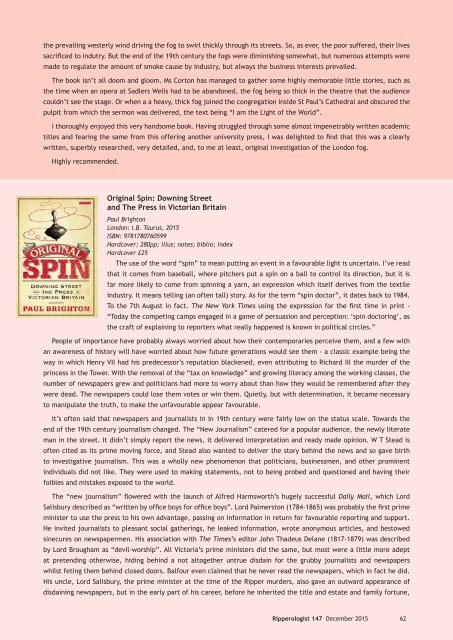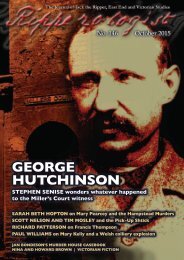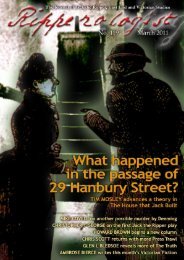Edmund Reid
nuhf574
nuhf574
Create successful ePaper yourself
Turn your PDF publications into a flip-book with our unique Google optimized e-Paper software.
the prevailing westerly wind driving the fog to swirl thickly through its streets. So, as ever, the poor suffered, their lives<br />
sacrificed to indutry. But the end of the 19th century the fogs were diminishing somewhat, but numerous attempts were<br />
made to regulate the amount of smoke cause by industry, but always the business interests prevailed.<br />
The book isn’t all doom and gloom. Ms Corton has managed to gather some highly memorable little stories, such as<br />
the time when an opera at Sadlers Wells had to be abandoned, the fog being so thick in the theatre that the audience<br />
couldn’t see the stage. Or when a a heavy, thick fog joined the congregation inside St Paul’s Cathedral and obscured the<br />
pulpit from which the sermon was delivered, the text being “I am the Light of the World”.<br />
I thoroughly enjoyed this very handsome book. Having struggled through some almost impenetrably written academic<br />
titles and fearing the same from this offering another university press, I was delighted to find that this was a clearly<br />
written, superbly researched, very detailed, and, to me at least, original investigation of the London fog.<br />
Highly recommended.<br />
Original Spin: Downing Street<br />
and The Press in Victorian Britain<br />
Paul Brighton<br />
London: I.B. Taurus, 2015<br />
ISBN: 9781780760599<br />
Hardcover; 280pp; illus; notes; biblio; index<br />
Hardcover £25<br />
The use of the word “spin” to mean putting an event in a favourable light is uncertain. I’ve read<br />
that it comes from baseball, where pitchers put a spin on a ball to control its direction, but it is<br />
far more likely to come from spinning a yarn, an expression which itself derives from the textile<br />
industry. It means telling (an often tall) story. As for the term “spin doctor”, it dates back to 1984.<br />
To the 7th August in fact. The New York Times using the expression for the first time in print -<br />
“Today the competing camps engaged in a game of persuasion and perception: ‘spin doctoring’, as<br />
the craft of explaining to reporters what really happened is known in political circles.”<br />
People of importance have probably always worried about how their contemporaries perceive them, and a few with<br />
an awareness of history will have worried about how future generations would see them - a classic example being the<br />
way in which Henry VII had his predecessor’s reputation blackened, even attributing to Richard III the murder of the<br />
princess in the Tower. With the removal of the “tax on knowledge” and growing literacy among the working classes, the<br />
number of newspapers grew and politicians had more to worry about than how they would be remembered after they<br />
were dead. The newspapers could lose them votes or win them. Quietly, but with determination, it became necessary<br />
to manipulate the truth, to make the unfavourable appear favourable.<br />
It’s often said that newspapers and journalists in in 19th century were fairly low on the status scale. Towards the<br />
end of the 19th century journalism changed. The “New Journalism” catered for a popular audience, the newly literate<br />
man in the street. It didn’t simply report the news, it delivered interpretation and ready made opinion. W T Stead is<br />
often cited as its prime moving force, and Stead also wanted to deliver the story behind the news and so gave birth<br />
to investigative journalism. This was a wholly new phenomenon that politicians, businessmen, and other prominent<br />
individuals did not like. They were used to making statements, not to being probed and questioned and having their<br />
foibles and mistakes exposed to the world.<br />
The “new journalism” flowered with the launch of Alfred Harmsworth’s hugely successful Daily Mail, which Lord<br />
Salisbury described as “written by office boys for office boys”. Lord Palmerston (1784-1865) was probably the first prime<br />
minister to use the press to his own advantage, passing on information in return for favourable reporting and support.<br />
He invited journalists to pleasant social gatherings, he leaked information, wrote anonymous articles, and bestowed<br />
sinecures on newspapermen. His association with The Times’s editor John Thadeus Delane (1817-1879) was described<br />
by Lord Brougham as “devil-worship”. All Victoria’s prime ministers did the same, but most were a little more adept<br />
at pretending otherwise, hiding behind a not altogether untrue disdain for the grubby journalists and newspapers<br />
whilst feting them behind closed doors. Balfour even claimed that he never read the newspapers, which in fact he did.<br />
His uncle, Lord Salisbury, the prime minister at the time of the Ripper murders, also gave an outward appearance of<br />
disdaining newspapers, but in the early part of his career, before he inherited the title and estate and family fortune,<br />
Ripperologist 147 December 2015 62




